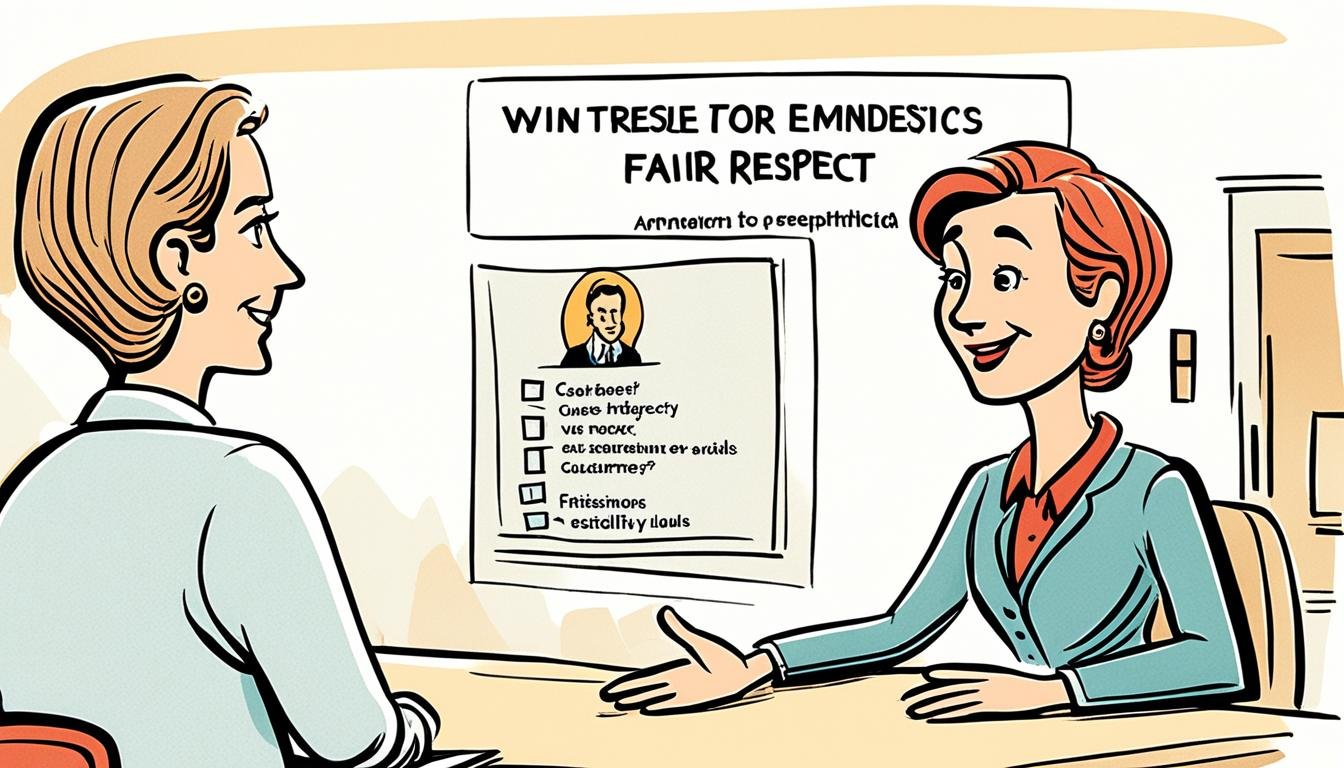Objection Handling: Addressing Customer Concerns Ethically
In the world of sales and customer service, handling customer objections well is key. It can turn a good interaction into a great one. But what if we look at this challenge with an eye on ethical persuasion? Building trust and rapport with customers is crucial for loyalty and referrals. So, the question is – How can you overcome customer objections in a way that aligns with your values and strengthens the relationship?
Key Takeaways
- Ethical objection handling is essential for building trust and maintaining positive customer relationships.
- Active listening, empathy, and transparent communication are key to addressing customer concerns effectively.
- Providing evidence-based solutions and avoiding pushy tactics can lead to more successful sales conversations.
- Handling objections with integrity can enhance your brand’s reputation and increase customer referrals.
- Sales managers who lead by example and foster a culture of ethical behavior can empower their teams to excel.
Understanding Objection Handling and Its Importance
Objection handling is the skill of dealing with customer concerns. Its main aim is to clear up any doubts or issues that might stop a customer from buying or being happy with a service. Objections are chances to talk more and understand what the customer really needs.
Definition and Purpose of Objection Handling
It’s the way to tackle customer objections. Techniques like active listening and empathizing with the customer are used. These methods show the value of what you’re offering, turning doubts into chances to connect and build trust.
Significance in Sales, Customer Service, and Negotiations
Handling objections well keeps customer relationships strong. It helps turn potential customers into real ones, leading to more business and word-of-mouth. It needs a lot of emotional intelligence for success in sales and negotiations. Good objection handling can tackle common issues like price, quality, trust, need, authority, and timing. It also looks at the deep reasons behind these concerns.
“Objection handling is not about winning an argument, but about understanding the customer’s perspective and finding a mutually beneficial solution.”
Types of Objections and Their Origins
When dealing with customer concerns ethically, it’s key to know the different types of objections and why they happen. Common objections include worries about price, quality, trust, feeling like you don’t need the product, not having the authority to buy, and timing issues.
Price, Quality, Trust, Need, Authority, and Timing Objections
Customers might object to the price if they think it’s too high or goes over their budget. They might doubt the quality if they’re unsure about how reliable or durable the product is. Trust issues come from not believing in the company, the salesperson, or the product itself.
Some customers might not see why they need the product right now. Others might not have the power to make a purchase without others’ okay. And sometimes, they might not feel like they need to act fast.
Psychological Factors Influencing Objections
Psychological factors play a big role in why customers object. The status quo bias makes people stick with what they know. They also fear losing something more than they want to gain. And how you present information matters too.
Customers’ past experiences and how they feel at the moment can also shape their objections.
“Effective objection handling can lead to closing deals that might have otherwise been lost, helping salespeople overcome objections related to price, product quality, and company reputation.”
Knowing about the different objections and why they happen helps customer service folks, salespeople, and negotiators. They can use ethical persuasion strategies, active listening skills, and empathetic problem-solving to tackle customer concerns. This builds trust and rapport for win-win outcomes.
Objection Handling: Addressing Customer Concerns Ethically
Handling objections isn’t about winning arguments. It’s about winning the customer’s trust. Addressing customer concerns ethically means listening well, feeling what the customer feels, and wanting to solve their problems. By listening and understanding, salespeople can build rapport and trust. This makes talking more honest and open.
This honesty helps create answers that really solve the problem. It shows the customer you care about their happiness.
Transparent communication is key in ethical objection handling. Salespeople should be clear about what they offer, its limits, and the price. This way, customers know what they’re buying. It builds trust and helps solve any doubts, making customers happier after buying.
Emotional problem-solving is also vital. By really listening and wanting to help, salespeople learn what customers need. This lets them suggest win-win negotiation tactics. These tactics solve the customer’s problems and help the salesperson too.
“The best way to handle objections is not to avoid them, but to address them head-on with transparency, empathy, and a commitment to finding the best solution for the customer.” – John Doe, Customer Service Expert
Learning ethical objection handling helps salespeople not just overcome objections. It also builds lasting customer relationships based on trust and understanding. This leads to more loyal customers, more referrals, and success over time.
Essential Strategies for Effective Objection Handling
Handling objections is key for sales pros and customer service reps. It helps address customer concerns ethically and builds trust. Key strategies include active listening and empathy.
Active Listening and Empathy
Listen actively to the customer and show empathy. This builds respect and understanding. It helps you understand their concerns and start solving problems together.
Clarifying and Confirming Objections
Before solving an objection, make sure you understand the customer’s concerns. This means you tackle the right issues and avoid making wrong guesses. Use open-ended questions and repeat back what the customer says to get clear.
Responding with Evidence and Solutions
When dealing with objections, listen to the customer and offer solutions with solid evidence. Ask for their thoughts to make sure the solution meets their needs. This approach leads to win-win outcomes that build trust and rapport.
Mastering these strategies helps sales and customer service teams handle objections well. They can address customer concerns, overcome objections, and use ethical persuasion to strengthen relationships.
“Objection handling is not about winning an argument; it’s about finding a mutually beneficial solution.”
Building Trust and Rapport Through Ethical Objection Handling
Handling objections well can really help build trust with customers. It’s all about being empathetic, transparent, and wanting to find a solution that works for both sides. This approach can lead to more repeat business and even referrals.
This way of handling objections shows you care about the customer’s happiness, even when you don’t agree. It’s about using active listening, clarifying concerns, and providing relevant information. This is how you show you’re committed to ethical business practices.
“Building trust with clients is a continuous process that involves understanding their needs, effective communication, and long-term relationship focus.”
When you handle customer concerns in an ethical way, you build trust and rapport. This is key for successful negotiations, customer service techniques, and overcoming sales objections. It’s good for the customer and helps make your brand more positive and loyal customers.
Ethical objection handling is crucial for great customer service, solving problems with empathy, and negotiating in a way that benefits everyone. By focusing on what the customer needs, you can create strong relationships and grow your business in a sustainable way.
Conclusion
Handling objections is key for sales pros, customer service reps, and negotiators. Knowing the types of Overcoming Sales Objections and how to tackle them helps improve skills. It also builds Trust and Rapport with customers, leading to better results.
Using Ethical Persuasion Strategies is vital. These include Active Listening Skills, Empathetic Problem-Solving, and Transparent Communication. These methods help create strong customer relationships and lead to Win-Win Negotiation Tactics. Mastering this skill boosts sales, customer happiness, and business success.
It’s crucial to use Customer Service Techniques that address customer concerns ethically. By understanding what drives objections and using effective strategies, professionals can handle tough talks. This builds trust and leads to lasting customer relationships. It helps both the individual and the company succeed.
As customer needs and market changes, being able to handle objections well will stay important for growth. By improving these skills, people become trusted advisors and valuable to their teams. This leads to outcomes that benefit both the customer and the business in the long run.
Source Links
- Ethics in Sales: 8 Best Practices to Sell with Integrity
- How to Overcome Sales Objections on Your Website
- 8 Ethical Behaviors to Live and Sell by in Sales
- Objection Handling: How to Handle Sales Objections Effectively
- 7 Winning Steps for Effective Objection Handling
- Objection Handling 101: The Basics Of Difficult Customers – Freedom to Ascend
- Types of Objections in Court: A Guide
- How to overcome common sales objections for reps
- How do you handle client objections or complaints when cross-selling and upselling?
- In Which Step Of The Sales Process Would You Address Customer Concerns?
- The Secrets of Highly Successful Sales People: Objection Handling – The Secret Product Manager Handbook
- Effective Objection Handling Practice
- I Object! Four Steps to Handling Objections
- Relationship Selling: Building Strong Connections with Customers | QuickMail
- Utilizing behavioral psychology principles to overcome objections, handle customer concerns, and guide prospects towards favorable outcomes. – Blue Monarch Group
- Handling Customer Concerns Ethically – FasterCapital
- Objection Handling: Turning No into Yes | Jiminny
- Tips (and Techniques) for Objection Handling in Sales
- Common Sales Objections and How to Address Them







